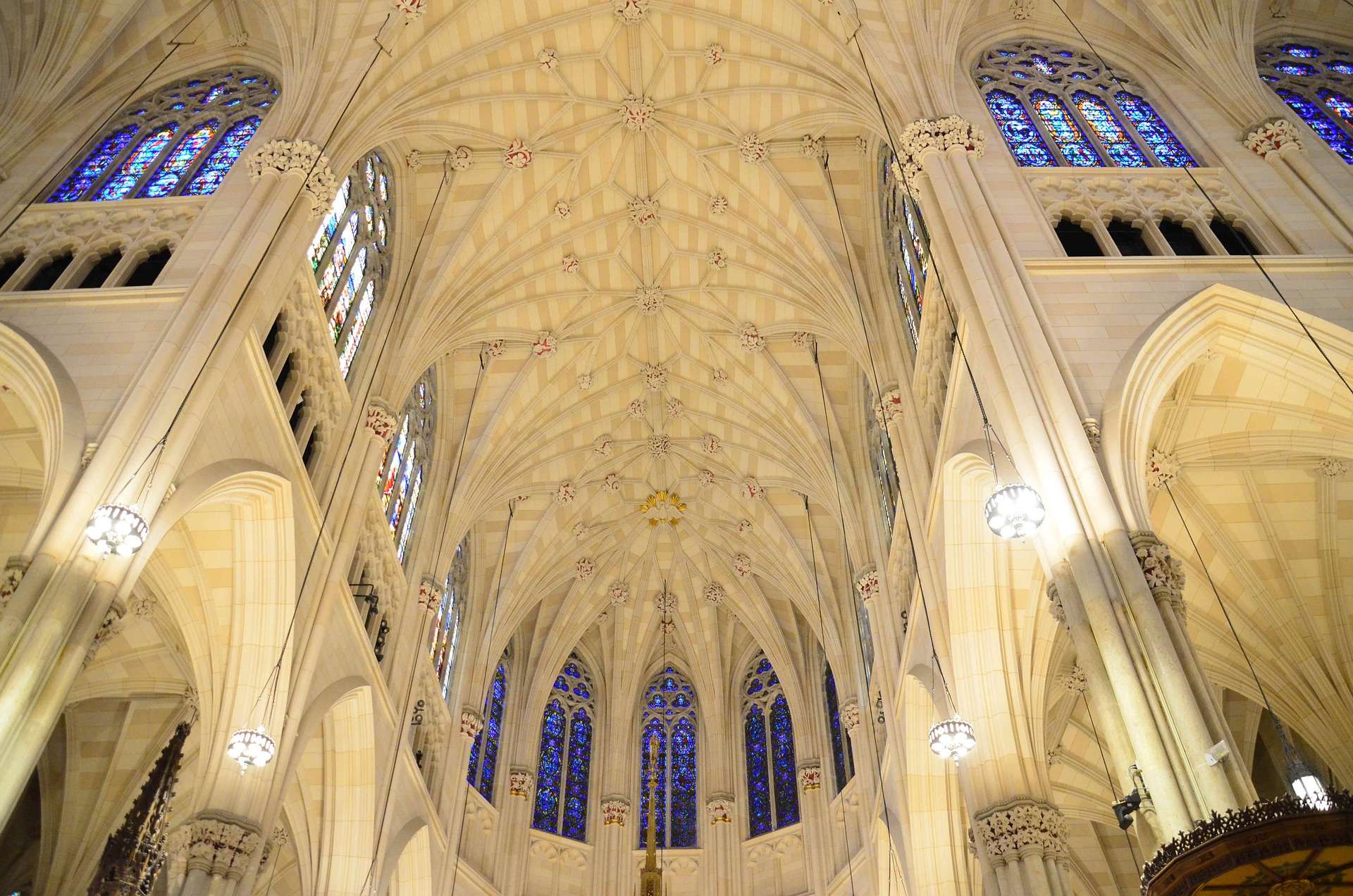By Fr. Dan Westermann
A few years ago, my friend made his final vows in New York City. I flew out early to spend time with another priest friend. We wandered around Times Square and other popular sites. I found myself drawn into the rush and almost overwhelmed by the chaos of the city. Everybody moves fast. We dodged folks and tried to get places as quickly as possible. There were bright lights, car horns, and other noises.
I found myself hating it. At one point, we were walking on the sidewalk; people were rushing, cutting people off, and trying to move as efficiently as possible. We approached a woman with a stroller at an intersection, and initially I was inclined to push past her. Thanks be to God, I caught myself and realized how crazy I was acting. I stopped, smiled at the woman, and let her go first. She reluctantly smiled back; I think she was confused and wondering, “Why is this person letting me go first?”
Later, my friend took me to St Patrick’s Cathedral. I sat down in Adoration and finally took a deep breath and relaxed. I thought about how fast-paced and desperately in need of the Lord our culture is.
After my friend’s final vows, a big group of priests and religious stood on the street in New York City. It was phenomenal to witness with these people that there’s more to life than hustle and bustle and chaos. We desperately need silence and solitude. We cannot flourish as disciples without times of silence and solitude throughout our days. Scripture highlights this:
- Elijah, who had been fiercely defending the Lord, ran in fear after killing the prophets of Baal. As he prayed on Mount Horeb, he heard different loud noises, but God spoke in the still, small voice.
- At the Annunciation, the Angel Gabriel likely came to Mary while she was in prayer, in silence and solitude.
- Jesus often went to the wilderness to spend time alone with the Father. Jesus wasn’t annoyed with his disciples or frustrated with being around so many people. He was demonstrating how to find intimacy with the Father.
Solitude is a privileged place of encounter with the Father. In silence, I must confront the broken places in my heart—places I’m not proud of. As we become aware of those places, we can bring them to the Lord.
It’s like being at the ocean, where waves prevent us from seeing the deeper reality beneath the surface. The Lord wants us to live out of the deep places; to do that, we must get past the choppiness on the surface. When we step away from the noise of this world, we can encounter the Lord in a deep place in our hearts.
This truth is reflected in a beautiful story about St. John Vianney—the patron saint of priests, who brought renewal to his parish. He kept noticing an elderly parishioner sitting in the church and finally asked what he was doing all day. The man responded, “I look at Him, and He looks at me.” This illustrates what we’re invited to in silence: to gaze upon Jesus and allow Him to look at us. Jesus Himself spends time in prayer with the Father before making big decisions like calling the apostles. We are all called to be on mission, and for fruitful and effective ministry, we must live out of a deep place of intimacy with the Lord.
Another example comes from my time in seminary in Rome. One of my priest formators made his retreats at a Carthusian monastery. The Carthusians have never needed renewal; their rule of life is so strict, they’ve never had to revisit anything. They spend most of their days in silence. They can talk one day a week. When one of the Carthusian monks was being transferred to a different monastery, which rarely happens, a group of us seminarians got to spend time with him. He was incredibly normal, very calm, collected, and peaceful. I said, “Father, you spend most of your days in silence. What does your prayer life look like?” He answered, “Prayer becomes more and more simple.”
As he shared this, I thought of the story of St. John Vianney. This Carthusian monk continued, “As I enter into prayer, I pull up a chair, and I sit and behold the gaze between the Father and the Son.” He said when the Father looks at Jesus on the cross, He sees all of humanity with an intense love and fierce passion. You could spend a lifetime praying with this image of the Father’s love for the Son and the Son’s love for the Father. This is what we’re drawn into as Christians. This is who the Holy Spirit is—the love between the Father and the Son. We’re given a spirit of adoption; we’re taught to cry, “Abba, Father!” (Rom 8:15) As we enter into silence with the Lord and become aware of those deep places, we can experience being loved by the Father there. From that place of intimacy, we can boldly witness to Jesus’ name. Being deeply rooted in our identity as beloved sons and daughters of the Father allows us to not fear persecution or other difficulties.
Every disciple is invited into an intimate relationship with the Lord that looks different for different people. Each day, a Carthusian monk may have nine hours to spend in silent prayer, a married person with young kids may only have a half hour, and a single person may have an hour. We enter silent prayer with the Lord by turning off other things. I recently heard that the average young person looks at their phone more than 350 times a day! That’s shocking!
Consider that initial image of New York City and how much the world tries to keep us on a surface level, distracted by the choppy water. Social media is designed to keep us busy, distracted, and numb. It shuts off our prefrontal cortex—the decision-making part of our brain—so that we swipe mindlessly and spend as much time on our devices as possible. We can increase the silence in our days by setting limits on what we do with our devices. If you’re on social media, turn off app notifications. It’s going to be difficult at first, and you may experience withdrawal. I promise, however, that you will never regret turning off social media. You will never think, “I’m disappointed about having more authentic relationships with others and entering into prayer with greater ease.”
Intentionally discern how to limit distractions to prayer. This may even mean music, which influences us even where we’re not aware of it. In a waiting room, the background music can move your heart without you even paying attention. If you crank the radio on as soon as you get home or in the car, I invite you to take advantage of the opportunity for silence. Turn off music, turn off things that distract you from the Lord.
We must intentionally carve out time for silence with the Lord. It may be early in the morning, when your kids take an afternoon nap, or late at night. It’s going to be difficult and a sacrifice, but you will never regret spending time with the Lord. You won’t say, “I’m frustrated by how peaceful life can be when I’m entering into silence with the Father.”
Finally, while we all want to experience what the Carthusian described as beholding the gaze between the Father and the Son, it often begins with naming what’s going on in our hearts. This is the beauty of silence. Using that image of water again, as we plunge into the deeper water and begin noting what’s going on, it helps to pray like a pirate. Use the acronym “A-r-r-r.” First, acknowledge what is going on in our hearts. If we’re in a place of frustration or anger, or if we’re worked up because of an interaction with a co-worker or a family member, we need to gently acknowledge what’s stirring in our heart. Then, relate it to Jesus. Tell Jesus, “I am frustrated with my brother. I can’t believe this thing that he said to me”—or whatever it might be. After we’ve related it to Jesus, we’re invited to wait to receive.
As Jesus spends time in intimacy with the Father, they dialogue with each other, and we are invited into that reality too. Relate this place of frustration to Jesus, then wait to receive whatever He wants to communicate about it. Maybe it’s a gentle conviction that I’ve done the same thing before, or maybe the Lord gives me compassion for the person. Then, respond to the Lord. Maybe I offer a prayer that gives this brother to the Lord and repents of the judgment in my heart towards him. This simple acronym transforms what could be a distraction into a deeper encounter with the Lord.
Forming this disposition of silence and prayer allows us to live in deep peace and contentment with the Lord. We won’t get whipped around by the difficulties of the day or stirred up into a flurry when something goes wrong. It is hard, and I’m still learning this, but it’s worth it!
This article originally appeared in Renewal Ministries’ May 2023 newsletter and is condensed from the February 2023 id Disciple’s Night, which can be viewed here.
Fr. Dan Westermann is the pastor at St. John the Baptist Parish in Ypsilanti, Michigan.








0 Comments